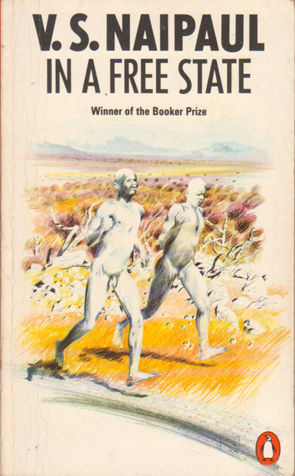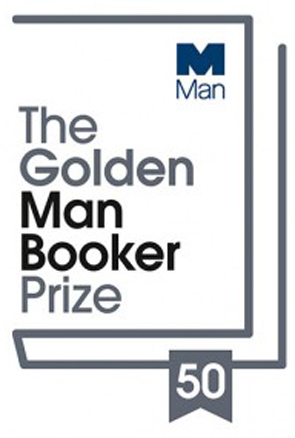In a Free State won the Man-Booker Prize in 1971, and is the book which has been chosen to represent the first decade, the 1970s for the Golden Man Booker Prize, representing the best of the first fifty years of the Man Booker Prize. I’ve been told that it isn’t a book which would be considered for the prize these days, due to the format. Rather than a single novel, the book is comprised of two short stories and a novella, with a few pages from a travel journal serving as a prologue and epilogue. Each has a different setting, different countries and different characters, with no connection between them.
As I first started reading, I wasn’t grabbed by the book. The writing was vivid and descriptive, but the first story was depressing. Things picked up with the second story, still not a cheerful read, but the story caught at me and I started enjoying it. Then came the novella, and I was enthralled by this incredibly simple story.
The first story, One Out of Many, set in Bombay and Washington DC, tells the story of Santosh, the servant of an Indian civil servant. The second story, Tell Me Who to Kill, is set somewhere in the West Indies and London, with an unnamed narrator works to support his younger brother’s studies. And the novella, In a Free State, is set in an unnamed Africa country which has recently gained self-government. The epilogue and prologue, The Tramp at Piraeus and The Circus at Luxor, are set on the way to Egypt and in Egypt. The theme that links each of these disconnected stories is that the characters are all displaced from their native land, and all have to find their way and place in a place that is very different to what they have known before.
The journals mainly seem to be about intolerance and the cruelty people can treat others with. Two Lebanese travellers join with an Austrian to persecute an old tramp who seems to have some mental health issues. Italian tourists deliberately tempt beggar children with food knowing that a waiter will whip them before they can get the food. These scenes are so vividly described that you could picture them clearly, but are just little snippets.
In One Out of Many, Santosh lives a contented life in Bombay, happy to be the servant of a civil servant, and to spend most of his nights sleeping on the street with friends. But he finds he will be out of a job when his master is posted to the US. He persuades the Sahib to take him to Washington, but then finds himself trapped in their apartment. He has little money (Sahib continues to pay him basically the same wage he received in India), is alone and lost. He is isolated from everyone, even his employer, and this never seems to change. Eventually he escapes from his employer and finds himself a job, but then realises that he is in the country illegally and will be deported if caught. Ironically the time Santosh seems to be happiest and to feel the most free in Washington is in the period when he is illegal.
Tell Me Who to Kill has an unnamed, illiterate, unreliable narrator describe his hopes for his younger brother to get an education and a better life, and his working to make sure his brother can get this. He is so blinded by his ambitions for his brother that he doesn’t see that his brother doesn’t share his ambitions and isn’t really academically inclined.
A common idea popping up through this story is the deceptive nature of appearance. The narrator talks of a rich man’s house, then finds that the man wasn’t really rich and the house is a shell. Uncle Stephen is thought by the family to be successful and well-off, then we see later that Stephen isn’t really too successful, he only appears that way in comparison to his brother. So it is no surprise to find that the narrator’s ambitions for his brother are equally based on a false premise of his brother’s studiousness. Near the end of the story the narrator attends his brother’s wedding. He can clearly see that the wedding is wrong, but as we already know by this point that the narrator’s perception is flawed, we are left with an idea that it probably will work out. After all, once free of the narrator, the brother appears to have survived quite well.
Then we finally come to In a Free State. Two tribes are struggling to control the newly self-governing country. The fight is between the President and the Monarchy in appearance, but in reality is the continuance of an old tribal war. The country is not named. Some aspects of the descriptions, especially of the President, reminded me of Uganda and Idi Amin. But at other points, escaping across the border to South Africa is mentioned, which suggests the setting is Zimbabwe or Botswana or another nation near the south of the continent. Bobby and Linda live in the Southern Collectorate, in territory loyal to the King. They have been in the capital in the north, controlled by the President, and spend two days driving down the highway towards the safety of their home.
In a way this story reminded me of The Adventures of Huckleberry Finn, with their car on the highway fulfilling a similar role to the boat on the river. Every so often they have to leave the safety of their car and interact with other people. There is a sense of danger present in the story from the start, with the noises in the night which Bobby hears from his hotel room in the capital, the helicopters overhead and the hints that the King is trying to escape.
Neither Linda nor Bobby are particularly pleasant characters, with Linda initially appearing the worst of the two with her intolerant view of Africans and almost everything in Africa. Bobby initially appears more comfortable in Africa. He has no desire to leave as many other white settlers do, appreciates the art and beauty he has found and he easily pronounces African names that Linda hasn’t bothered trying to learn in the six years she has been there. But then there is an encounter when they stop to refuel the car and a black attendant damages the windows of the car. Bobby explodes, showing that he also has his prejudices, he just normally covers them better. Possibly his homosexuality has led him to generally being better at covering up his real feelings.
The feeling of menace which is built up slowly with each incident reaches a climax when Bobby stops at a roadblock.
Overall, I found this book to be beautifully written, the descriptions, especially of Africa in the final story, are all so vivid that you can feel yourself there. But it was also fairly depressing, with nothing to provide any uplifting emotions to the reader. I read the book fairly quickly, I always regretted having to put it away at the end of each train trip, but it’s not a book I’d recommend to anyone who is just after an enjoyable read.

 RSS Feed
RSS Feed Facebook
Facebook Instagram
Instagram YouTube
YouTube Subscribe to our Newsletter
Subscribe to our Newsletter




No one has commented yet. Be the first!